

Arguing with students in Egypt: A terrible market to invest
Burton Flynn and Ivan Nechunaev
November 2025


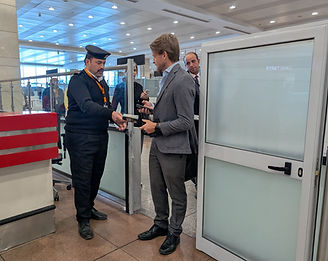





Building the pyramid
As we waited for our car on a chaotically busy street in old town Cairo, we were approached by a group of local students who had just visited the Egyptian stock exchange museum at the same time we were there.
“Can I ask you a question?”, said one of them confidently, without hesitation. “Why do you invest in Egypt? It's been a terrible market to invest. You might be better off investing in Europe.”
“Why Europe?”, was our turn to ask. We continued: Europe is in a demographic decline (with an average fertility rate in the EU under 1.4 children per woman) and is dealing with an aging population (with an average age of 45), which will result in a greater social welfare burden and workforce shortages going forward. In comparison, Egypt's population is growing (with a high birth rate of 2.5) and is nearly half as young as Europe’s (with an average age of 24). Since we last visited Egypt in 2019, its population increased by almost 10 million people (from 98 to 108 million), of which about 8 million came from organic growth.
To think about it, the 10% increase in Egypt's population in just the last six years is double the entire population of Finland! Such a quick and great expansion in the country’s consumer base clearly creates a lot of opportunities for local businesses serving the needs of the growing population. While the Europeans are reaching the peak of their demographic pyramid, the Egyptians are only building the foundation of theirs, following in the footsteps of their ancient forefathers that created the only standing monument of the Seven Wonders of the Ancient World – the Great Pyramid of Giza which we enjoyed seeing and being amazed by from our car as we navigated in and around Cairo between our meetings.
Switching from demographic to economic factors, while we agree that Egypt has had its share of economic challenges in the past decade, it has managed to stabilize the pound after devaluing it in early 2024, attracted multi-billion-dollar Middle Eastern investment in the last two years, brought down inflation from 36% in February 2024 to under 12% in September 2025, and started gradually reducing the interest rates from 27% in March 2025 to 21% in October 2025. All of these recent developments bode very well for economic activity and business sentiment in the country, and there is still a lot of room for continued economic stimulus – further reducing interest rates down from 21% in Egypt seems more profound than lowering them from 2% in Europe.
What is most important for us as bottom-up investors is that even in markets like Egypt – which is historically handicapped from a macro noise perspective – it is still possible to find great stock-picking opportunities, we told our new friends. For example, in the last decade our fund had some of its biggest winners in countries such as Malaysia and Turkey, while those markets’ indices were negative. Some of the Egyptian stocks now begin to appear very attractive, as the currency stabilization, decline in inflation, and interest rate cuts provide a supportive backdrop for earnings growth. It only helps that the valuations on the Egyptian stock exchange are very cheap as a result of several years of prior economic turbulence.
As a matter of fact, companies in the main Egypt index are expected to grow earnings by 20% in 2026 according to Bloomberg, while earnings growth of companies in the mainstream Europe index is expected to be 10% (in US dollar terms). At the same time, Egyptian stocks trade at an average P/E ratio of 8x, compared to 17x P/E for Europe. Essentially, an investor in Egypt gets companies that are half the valuation and double the growth of their listed European peers! – this is exactly why we came to Egypt and not to "Europe" on this trip. We wanted to visit and analyze a few cheap listed Egyptian companies positioned for strong performance in the next few years.
We were not sure if the open-minded students bought into our “why Egypt” arguments. However, we really appreciated their curiosity and willingness to engage in a dialogue with foreign investors in the middle of all the Cairo street chaos to try to understand our logic. We strongly believe these curious students can build the best future that Egypt has ever had.

We made a research trip to Egypt and enjoyed thoughtful, even if spontaneous, conversations on the ground

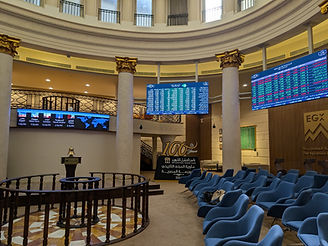




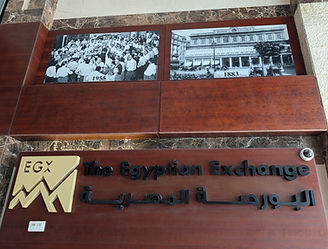
Ringing the bell at the stock exchange
We love learning about the nature of the markets we invest in from all possible angles, including historical and cultural, and this passion for trying to understand the factors shaping market development brought us to the Egyptian stock exchange (EGX) museum located in the beautiful and bustling downtown Cairo. Gladly following along with dozens of local students and guided by the EGX’s head of financial literacy, we certainly appreciated the charm of this storied market institution, which was established in Alexandria way back in 1883 (becoming the first stock exchange on the African continent) before moving to Cairo where it opened doors in 1928 in what is now known as the “old” EGX building which hosts the museum. We enjoyed our tour and were childishly happy to ring the bell – cheers to the many future Egyptian IPOs!

Ringing the bell and heralding new market highs at the historic Egyptian stock exchange in downtown Cairo
After visiting the old stock exchange, we proceeded to the new EGX campus outside central Cairo where we met with the exchange’s head of international relations. The kind lady shared with us that liquidity in the market has been strongly improving (with a 64% increase in the value traded) and Egypt had the highest number of new retail investor accounts in the Middle East last year. The exchange is working on new products to enhance investor reach and recently launched a Shariah-compliant ETF. We learned a fun fact: one of the 11 IPOs that took place on the EGX last year was oversubscribed a solid 59 times!
In our view, publicly listed Egyptian brokerage houses – for example an $800m firm trading at 11x LTM P/E which organizes the world's largest Middle East and North Africa investment conference in Dubai every year – might benefit from Egypt's economic renaissance and potential resolution of regional geopolitical conflicts, which will result in a further increase in local trading activity.
In total, there are 135 brokerage firms active in the Egyptian market, and there are over 240 firms listed on EGX with a total market capitalization of nearly $60b. On this research trip, we met with some of those public companies.

Visiting the new campus of the Egyptian stock exchange outside central Cairo






Unicorn hiding behind Chinese SUVs
We met with the CEO of a $500m local auto manufacturer trading at 7x LTM P/E which makes cars under Korean and Chinese brands, as well as distributes imported Japanese, Korean and Chinese vehicles. We toured the firm's busy factory outside Cairo and observed the entire impressive automated manufacturing process from start to finish. The company has recently started exclusively distributing in Egypt a particular Chinese SUV which has already proven a massive hit in Pakistan (we did a test drive of that SUV on the streets of Lahore) – we are confident it will be equally successful on the streets of Cairo.

Visiting a factory making Korean cars outside Cairo
In addition to the firm's growing car-making business, there is also one large hidden value catalyst which makes this investment case especially exciting. In the last few years, the company has made venture investments in an Egyptian startup which originally focused on ride-hailing and then switched to fintech initiatives such as lending and payments. This startup has been rapidly scaling, having expanded into the UAE, Turkey, and Pakistan so far. The value of the auto manufacturer's stake in this private venture – using media-reported numbers from the latest investment round which made this startup Egypt’s first fintech “unicorn” – is approximately worth as much as its entire market capitalization! In case this fintech goes for an IPO in the next few years, an enormous amount of value can be unlocked for the shareholders.

Meeting with the CEO of a $500m auto manufacturer

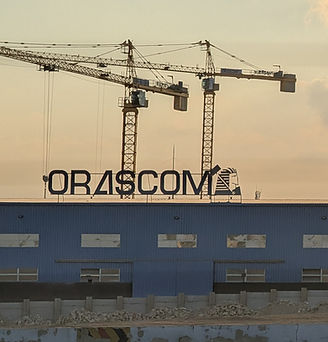
Land by the sea
We also met with the CEO of a $500m investment holding, which operates hospitality assets as well as owns and develops Egypt's most valuable land in El Gouna by the Red Sea. The company's land alone is worth over $1b, implying a steep sum-of-the-parts discount in the shares of the publicly listed holding. The business has a strong pipeline of projects and land sales, and trades at a very cheap valuation of 5x LTM P/E.
We appreciated the management’s focus on simplifying the corporate structure: the company's illiquid stock in Switzerland was recently delisted, supporting a more streamlined investor relations effort – serving investors of only one locally listed Egyptian entity, without unnecessary (and costly) administrative distractions abroad.

Meeting with the CEO of a $500m hospitality real estate developer and operator
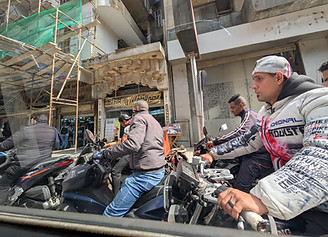


Best place to invest
Our discussions on the ground in Egypt with our local network revealed an improving business sentiment – nearly everyone is becoming more optimistic and is “hopeful” for good things to come for their country. The economic data confirms this mental trend: currency is more stable, while inflation is lower and so are the interest rates. For the local publicly listed companies, earnings growth expectations are picking up.
On this research trip, we enjoyed meeting resilient and entrepreneurial Egyptian businesses with strong growth prospects. We also enjoyed learning about the country’s stock market’s past and present, and hope to see a bright future ahead of it. And of course, we truly enjoyed engaging with the local youth and trying to convince them that the best places to invest are not in Europe – they are in emerging markets like Egypt.
We look forward to coming back to Egypt in the future and seeing the country’s progress propelled by its young curious minds.
